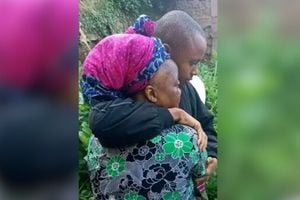Cosmetic surgery caused me gangrene, seizure; can I hold the clinic accountable?

A patient.
What you need to know:
- The Constitution guarantees the right to health, which includes access to the highest attainable standard of healthcare.
- Your case clearly points to medical negligence; the clinic owed you a duty of care to provide safe and competent medical services.
Dear Vivian,
I recently underwent a cosmetic procedure at a medical clinic, and while the surgery itself seemed to go well, I started experiencing complications during recovery. I had a seizure and was rushed to hospital, where I was diagnosed with gangrene caused by a botched cosmetic surgery. Given this was an elective cosmetic procedure, can I hold the clinic accountable?
Eva Wanjiru
Kilimani
Dear Eva,
Your situation highlights the importance of accountability in healthcare, including elective procedures like cosmetic surgery. The law provides avenues for justice and compensation when healthcare providers fail to meet their professional obligations, regardless of whether a procedure is elective or necessary.
The Constitution guarantees the right to health, which includes access to the highest attainable standard of healthcare. This right extends to all medical procedures, including cosmetic surgery, and healthcare providers are expected to deliver services that meet professional standards. Additionally, the Health Act reinforces the expectation that all patients, whether seeking essential or elective care, have the right to dignity and competent treatment. The clinic’s failure to manage your post-surgery recovery responsibly violated these legal principles, and the consequences you faced, including gangrene and seizure, were preventable with proper medical attention.
Your case clearly points to medical negligence. The clinic owed you a duty of care to provide safe and competent medical services, which were breached by their substandard care. The failure to address your condition caused harm directly linked to their negligence, resulting in physical suffering, emotional distress, and financial loss. These factors align with the legal framework for proving negligence. Kenyan courts have addressed medical negligence in cases that illustrate how healthcare providers can be held accountable. The courts have emphasised that negligence can arise from a failure to treat complications appropriately, leading to harm. Further, the courts have shown that damages can be awarded to patients who suffer because of substandard care, demonstrating the Judiciary’s commitment to enforcing accountability in the healthcare sector.
To seek justice, you should begin by gathering evidence, such as your medical records from the clinic and the hospital where you were treated after the seizure. It is also important to document the clinic’s responses during your recovery and any additional costs or harm you suffered. Filing a complaint with the Kenya Medical Practitioners and Dentists Council is a crucial step, as the council has the authority to investigate cases of medical negligence and impose penalties on healthcare providers.
You may also consider filing a civil lawsuit for compensation. Particularly if you discover that the hospital is not properly licensed to undertake this kind of surgery. Engaging a lawyer with expertise in medical malpractice will be essential to building a strong case and navigating the legal process. Cosmetic surgery, while elective, does not diminish your rights to safe and competent medical care. Pursuing legal action can not only help you achieve justice but also set a precedent that ensures healthcare providers are held to the highest standards, protecting other patients from similar harm.
Vivian
The writer is an advocate of the High Court of Kenya and award-winning civil society lawyer ([email protected]).





